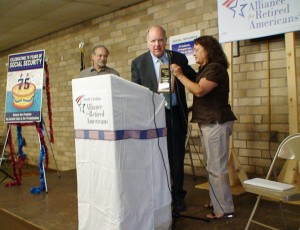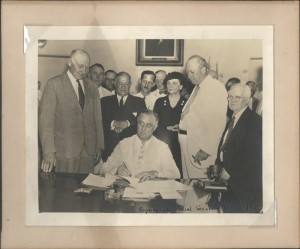President Barack Obama
The White House
Washington, DC 20500
Dear Mr. President:
We write you as the national officers and the presidents of the state chapters of the Alliance for Retired Americans, a national organization of four million members dedicated to securing a better quality of life for all Americans in retirement. We believe that you have the opportunity to renew the nation’s commitment to the Social Security program during the State of the Union Address next week.
Mr. President, Social Security, which just celebrated its 75th anniversary in 2010, is the nation’s premier social insurance program. It has provided economic security for millions of Americans of all ages across the last 75 years. From the nation’s youngest, who have lost a parent, to the oldest, who live in retirement, Social Security has been a constant, positive force in our nation’s life. Now, Social Security benefits go to nearly one in four American households.
Without the guaranteed benefits of the program, nearly half of older and disabled Americans would live in poverty. No other program, funded entirely by worker and employer contributions and without government funds, has had such a long lasting positive impact on American life. We are concerned, Mr. President, that many in Washington will try to take advantage of the nation’s current debt situation and cause permanent damage to the Social Security program.
As the Co-Chairs of the Commission on Fiscal Responsibility and Reform recently pointed out, the Social Security program has not contributed at all to the nation’s debt. While we disagree with many of the Co-Chairs’ Social Security recommendations, such as raising the retirement age and cutting benefits for current and future retirees, the fact remains that the current debt situation should not be a political cover for attacking the Social Security program. We strongly urge you to resist such efforts.
We urge you to speak forcefully in favor of a strengthened Social Security program. We recognize that long term efforts will be necessary to keep the program financially sound as well as being able to provide benefits that are adequate to maintain a dignified quality of life. However, the debate over the current debt situation is not the forum for debating the future of Social Security. We applaud your leadership on vital issues such as health care reform which has benefited our members. We believe you are now in a position to demonstrate that same leadership on behalf of the Social Security program.
Sincerely,
Barbara J. Easterling, President
Ruben Burks, Secretary-Treasurer
Edward F. Coyle, Executive Director
Douglas Hart, President
Arizona Alliance for Retired Americans
Nan Brasmer, President
California Alliance for Retired Americans
Vivian Stovall, President
Colorado Alliance for Retired Americans
Cal Bunnell, President
Connecticut Alliance for Retired Americans
Tony Fransetta, President
Florida Alliance for Retired Americans
Kenny Bradford, President
Georgia Alliance for Retired Americans
Al Hamai, President
Hawaii Alliance for Retired Americans
Barbara Franklin, President
Illinois Alliance for Retired Americans
Elmer Blankenship, President
Indiana Alliance for Retired Americans
Don Rowen, President
Iowa Alliance for Retired Americans
Mike Vivirito, President
Maryland/DC Alliance for Retired Americans
Dan Mikel, President
Minnesota Alliance for Retired Americans
David R. Meinell, President
Missouri Alliance for Retired Americans
Mike Owens, President
Missouri Alliance for Ret Americans Ed Fund
Bob Biel, President
Nebraska Alliance for Retired Americans
Scott Watts, President
Nevada Alliance for Retired Americans
Charlie Balban, President
New Hampshire Alliance for Retired Americans
Barbara Pardo, President
New Mexico Alliance for Retired Americans
Jim Wood, President
New York Alliance for Retired Americans
John Newman, President
North Carolina Alliance for Retired Americans
Dave Friesner, President
Ohio Alliance for Retired Americans
Jerry Morris, President
Oregon Alliance for Retired Americans
Jean Friday, President
Pennsylvania Alliance for Retired Americans
John Pernorio, President
Rhode Island Alliance for Retired Americans
Julie Harbin, President
South Carolina Alliance for Retired Americans
Shane Fox, President
Texas Alliance for Retired Americans
John Bloch, President
Vermont Alliance for Retired Americans
Mike Warren, President
Washington Alliance for Retired Americans
Sterling Ball, President
West Virginia Alliance for Retired Americans
Leon Burzynski, President
Wisconsin Alliance for Retired Americans





